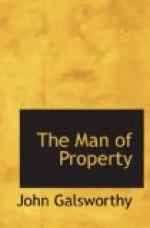If Jo were only with him! The boy must be forty by now. He had wasted fourteen years out of the life of his only son. And Jo was no longer a social pariah. He was married. Old Jolyon had been unable to refrain from marking his appreciation of the action by enclosing his son a cheque for L500. The cheque had been returned in a letter from the ’Hotch Potch,’ couched in these words.
’My dearest father,
’Your generous gift was welcome as a sign that you might think worse of me. I return it, but should you think fit to invest it for the benefit of the little chap (we call him Jolly), who bears our Christian and, by courtesy, our surname, I shall be very glad.
’I hope with all my heart that your health is as good as ever.
’Your loving son,
‘Jo.’
The letter was like the boy. He had always been an amiable chap. Old Jolyon had sent this reply:
’My dear Jo,
’The sum (L500) stands in my books for the benefit of your boy, under the name of Jolyon Forsyte, and will be duly-credited with interest at 5 per cent. I hope that you are doing well. My health remains good at present.
’With love, I am, ’Your affectionate Father, ‘Jolyon Forsyte.’
And every year on the 1st of January he had added a hundred and the interest. The sum was mounting up—next New Year’s Day it would be fifteen hundred and odd pounds! And it is difficult to say how much satisfaction he had got out of that yearly transaction. But the correspondence had ended.
In spite of his love for his son, in spite of an instinct, partly constitutional, partly the result, as in thousands of his class, of the continual handling and watching of affairs, prompting him to judge conduct by results rather than by principle, there was at the bottom of his heart a sort of uneasiness. His son ought, under the circumstances, to have gone to the dogs; that law was laid down in all the novels, sermons, and plays he had ever read, heard, or witnessed.
After receiving the cheque back there seemed to him to be something wrong somewhere. Why had his son not gone to the dogs? But, then, who could tell?
He had heard, of course—in fact, he had made it his business to find out—that Jo lived in St. John’s Wood, that he had a little house in Wistaria Avenue with a garden, and took his wife about with him into society—a queer sort of society, no doubt—and that they had two children—the little chap they called Jolly (considering the circumstances the name struck him as cynical, and old Jolyon both feared and disliked cynicism), and a girl called Holly, born since the marriage. Who could tell what his son’s circumstances really were? He had capitalized the income he had inherited from his mother’s father and joined Lloyd’s as an underwriter; he painted pictures, too—water-colours. Old Jolyon knew this, for he had surreptitiously bought them from time to time, after chancing to see his son’s name signed at the bottom of a representation of the river Thames in a dealer’s window. He thought them bad, and did not hang them because of the signature; he kept them locked up in a drawer.




